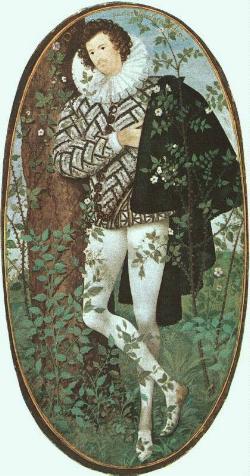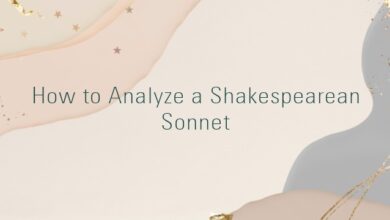
William Shakespeare – Sonnet 27
Weary with toil, I haste me to my bed,
The dear repose for limbs with travel tired;
But then begins a journey in my head
To work my mind, when body’s work’s expired:
For then my thoughts–from far where I abide–
Intend a zealous pilgrimage to thee,
And keep my drooping eyelids open wide,
Looking on darkness which the blind do see:
Save that my soul’s imaginary sight
Presents thy shadow to my sightless view,
Which, like a jewel hung in ghastly night,
Makes black night beauteous, and her old face new.
Lo! thus, by day my limbs, by night my mind,
For thee, and for myself, no quiet find.
Sonnets 27-30 are fairly meditative and quiet, exploring the traditional themes of sleeplessness, separation, bad fortune and sorrowful reminiscense.
Here the poet reflects on how thoughts of the beloved keep him awake, and even in darkness the image floats before him, like a jewel hung in ghastly night, making the face of night beautiful. Thus by day the poet is made weary by toil and travel, and by night rest is denied him, for he has to make journeys in his mind to attend on the loved one, who is far away.
This is the traditional theme of the sonneteers, echoing Sidney and others, who recount how they were stricken by being separated from their beloved. See for example the sonnet from Astrophel and Stella given at the bottom of this page. No doubt Shakespeare was conscious of these references to other loves in other circumstances, and one suspects that part of the richness of his own sonnet writing is that he is gently poking fun at all that has been written before on the theme of the haggard lover’s wakeful weariness.
The 1609 Quarto Version

WEary with toyle,I haſt me to my bed ,
The deare repoſe for lims with trauail tired,
But then begins a iourny in my head
To worke my mind,when boddies work’s expired.
For then my thoughts(from far where I abide)
Intend a zelous pilgrimage to thee,
And keepe my drooping eye-lids open wide,
Looking on darknes which the blind doe ſee.
Saue that my ſoules imaginary ſight
Preſents their ſhaddoe to my ſightles view,
Which like a iewell(hunge in gaſtlynight)
Makes blacke night beautious,and her old face new.
Loe thus by day my lims,by night my mind,
For thee,and for my ſelfe,noe quiet finde.
Commentary
1. Weary with toil, I haste me to my bed,The toil is either daily work, or the toil of travel, mentioned in the following line. travel, l.2, was frequently spelt travail, and there was little differentiation between the two words.2. The dear repose for limbs with travel tired;This seems to imply a journey, as also do 48, 50 and 51. The end of the journey would, as often as not, be a bed at an Inn. Travel was not easy, over roads full of potholes, crumbling bridges, and with the possibility of robbery being not too remote. The only practicable form of transport was on horseback, as sonnets 50 & 51 show. Here a similar journey away from the youth seems to be described.3. But then begins a journey in my headI.e. a mental journey to visit his beloved, now that the physical journey of the day is completed.4. To work my mind, when body’s work’s expired:To work my mind = which keeps my mind active and toiling,
when body’s work’s expired = when bodily toil is completed.5. For then my thoughts–from far where I abide–from far where I abide = far away from you, from where I am staying currently6. Intend a zealous pilgrimage to thee,Intend a zealous pilgrimage = start off on a journey. To intend a journey, meaning to commence or undertake a journey, was common parlance, deriving ultimately from Latin iter intendere. Pilgrimages were undertaken by the faithful in Shakespeare’s day as acts of devotion, involving long and tedious travelling, often on foot, or horseback, for several weeks, to visit some holy shrine. Chaucer’s pilgrims in the Canterbury tales were on horseback, but their journey was to take many days. There is nothing which corresponds to the experience in today’s world of easy travel, and for Shakespeare’s contemporary readers a zealous pilgrimage was a work of devotion lasting several weeks or months.
zealous = earnest, passionate, devoted.7. And keep my drooping eyelids open wide,drooping eyelids = eyelids heavy with sleep.8. Looking on darkness which the blind do see:His thoughts, travelling to his beloved, keep his eyes wide open, although they are tired (drooping), and he sees the darkness, as if he were a blind man, who sees only darkness.9. Save that my soul’s imaginary sightSave that = Except that;
my soul’s imaginary sight = the inner vision which my soul has, by using imagination.10. Presents thy shadow to my sightless view,Presents thy shadow = Sets in front of me your image. For shadow = image compare Sonn 43.4-5:
Then thou, whose shadow shadows doth make bright,
How would thy shadow’s form form happy show,
where shadow is used in several different senses ( image, shadow, shade, examples).
my sightless view continues the imagery of the blind man, darkness, and lack of vision. The blind man’s sightless view manages to see things because of the additional acuteness of the other senses that a blind person develops. The poet here sees nothing real, because of the night’s blackness, but his imagination conjures up the image of the beloved to his eyes.11. Which, like a jewel hung in ghastly night,which – i.e. your shadow.
a jewel etc. – the contrast is between the brightness of a diamond, or any other rich jewel, and the blackness of unseeing night.
ghastly night – night traditionally has some pejorative epithet attached to it. It was the time when evil deeds were most often done, the time when ghosts walked, and it was the colour of hell. Cf. Lady Macbeth’s words, when contemplating murder:
Come, thick night,
And pall thee in the dunnest smoke of hell,
That my keen knife see not the wound it makes,
Nor heaven peep through the blanket of the dark,
To cry ‘Hold, hold!’ Mac.I.5.47-51.12. Makes black night beauteous, and her old face new.Night’s face is old because night is as old as the world itself, even older according to Genesis I.4-5, 10.13. Lo! thus, by day my limbs, by night my mind,Lo! thus = So it is that, as I have shown, etc. Lo has a mild exclamatory force, equivalent to ‘Behold!’, ‘Look now!’.14. For thee, and for myself, no quiet find.For thee, and for myself – i.e. for both of us, because we are two hearts in one. Also, my thoughts, in visiting you, must cause you too to be awake.
Additional notes
Sidney. From Astrophel and Stella, Sonnet 89.
89
Now that of absence the most irksome night,
With darkest shade doth overcome my day;
Since Stella’s eyes, wont to give me my day,
Leaving my hemisphere, leave me in night,
Each day seems long, and longs for long-stayed night;
The night as tedious, woos th’approach of day;
Tired with the dusty toils of busy day,
Languished with horrors of the silent night;
Suffering the evils both of the day and night,
While no night is more dark than is my day,
Nor no day hath less quiet than my night:
With such bad mixture of my night and day,
That living thus in blackest winter night,
I feel the flames of hottest summer day.





